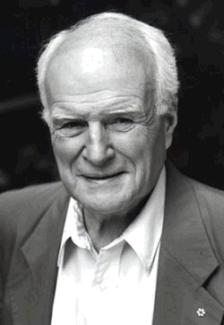
A Life Devoted to Healthy Development for All
J. Fraser Mustard
November 28, 2011

The Toronto Star recently reported the sad news that Canadian physician and researcher Dr. James Fraser Mustard died in his home at age 84. In addition to being a part of the research team that discovered aspirin could help reduce the likelihood of heart disease, Dr. Mustard studied early childhood development with his research influencing his home province’s education policy. His Early Years Study was used by the Ministry of Education in Ontario when it established a program to offer full-day kindergarten throughout the province. His broader body of work influenced early childhood policy around the globe.
Dr. Mustard was a strong global disseminator of the science base for public investments in early childhood development. He was expert in tying together diverse research from medicine, neuroscience, and social science so as to make clear to virtually any audience the connections and implications. Dr. Mustard had a keen understanding of the impacts of early brain development on later outcomes including adult health. He also understood the importance of showing policymakers and the public that the relationship between socio-economic background and human development is a gradient—a smooth continuous slope—and that the level and steepness of these slopes varies considerably across nations depending on their public policies. As he wrote in 2010:
“Results from developmental neurobiology studies and animal and human studies provide strong evidence that early neurobiological development affects health (physical and mental), behaviour and learning in the later stages of life. Countries that provide quality universal early development programs for families with young children tend to out-perform countries in which the early development programs are chaotic.”
Mustard was born in Toronto, Ontario and attended the University of Toronto. He later conducted postgraduate study at the University of Cambridge before returning to the University of Toronto as a research associate. He was also involved with the National Heart Foundation of Canada, the Canadian Heart Foundation, and the Royal College of Physicians and Surgeons of Canada, amongst others. Dr. Mustard was a founding member of both the McMaster Medical School and the Canadian Institute for Advanced Research, a multidisciplinary nonprofit that has conducted research on topics such as economic growth and policy, experience-based brain and biological development, human-environment interactions, human development, population health, and successful societies.
Beginning in the 1980s, Dr. Mustard became more involved with research on early childhood development and learning. He became the head of the Founders’ Network, a group dedicated to studying economic and social impacts on health and human development, with an emphasis on early childhood. Dr. Mustard’s research work produced the 1999 report on the Early Years Study commissioned by the government of Ontario and follow-up reports in 2002 and 2007. Collectively, the reports criticized Canada’s commitment to preschool learning and called for national early childhood development initiatives on par with K-12 education as a means to promote lifelong healthy outcomes. In 2004, Dr. Mustard co-founded the Council for Early Childhood Development, an organization whose goals include promoting the message of the Early Years Study and further studying early childhood development.
We are heartened that Dr. Mustard’s work proceeds on. Less than a week after his death, a third report based on the Early Years Study was published, recommending that children as young as 2 years old should have access to voluntary prekindergarten education. And, the full-day kindergarten initiative in Ontario continues to roll out, with final implementation slated for September 2014.
– Steve Barnett, Director, NIEER
– Jen Fitzgerald, Public Information Officer, NIEER
The Authors
W. Steven (Steve) Barnett is a Board of Governors Professor and the founder and Senior Co-Director of the National Institute for Early Education Research (NIEER) at Rutgers University. Dr. Barnett’s work primarily focuses on public policies regarding early childhood education, child care, and child development.
About NIEER
The National Institute for Early Education Research (NIEER) at the Graduate School of Education, Rutgers University, New Brunswick, NJ, conducts and disseminates independent research and analysis to inform early childhood education policy.

